Live Blogging Egypt in Crisis: Day Five
For the fifth straight day, protesters have taken to the streets of Cairo as President Hosni Mubarak refuses to step down and end his 30-year rule. Our blog covers the latest news coming out of Cairo.
3:01 a.m. ET: Reports on Twitter are circulating to the effect that Egypt is withdrawing Al Jazeera's press credentials.. Al Jazeera's Dan Nolan wrote in a tweet that Al Jazeera's licenses was being pulled. He then added: "Don't worry we'll still report what's happening in #Egypt no matter what new restrictions they put on us."
2:55 a.m. ET: Is the U.S. making a mistake by taking a too balanced position between the demonstrators and the Mubarak regime? That's the opinion of Carnegie Endowment's Marina Ottoway. In a piece she published today, Ottoway said the Obama administration was making a mistake by being too tepid. "Messages are circulating on the Internet to the effect that the United States is once again supporting authoritarianism. Washington must get off the fence and choose whether it wants to support democracy, and thus be on the side of Arab publics enraged by decades of repression, or whether it wants to continue supporting regimes that have been repressive for decades in the name of ill-defined strategic interests. It cannot do both." The same theme was echoed by demonstrators on Saturday.
2:40 a.m. ET: More on the reported jailbreaks overnight. Officials are telling the AP that the prisoners escaped from at least four jails after starting fires and clashing with guards.
2:25 a.m. ET: The Associated Press is reporting that Egypt has closed its border with the Gaza Strip.
2:18 a.m. ET: Egyptian military forces have begun patrolling the streets of Sharm el-Sheikh, the popular Egyptian resort village on the southern tip of the Red Sea, according to Al Jazeera. That has sparked rumors concerning the whereabouts of President Mubarak.
2:05 a.m. ET: A Facebook user named Leil-Zahra Mortada has compiled some amazing photos of women participating in the Egypt demonstrations:
1:49 a.m. ET: An army presence reported in Suez, but no sign of the local police.
1:22 a.m. ET: Army tanks in Cairo have set up a roadblock on a road leading to Tahrir Square, the scene of mass demonstrations the last several days.
1:14 a.m. ET: Saturday Night Live did a send-up of Hosni Mubarak with Fred Armisen impersonating Egypt's embattled president:
"[My people] love me. They are upset because the internet is down."
"I'm willing to take the following steps to show I'm willing to change. Number 1: I'm firing my cabinet. Number 2, I'm hiring a new cabinet, made up of members of my fired cabinet."
12:50 a.m. ET: As dawn broke in Cairo, reports circulated that several thousand inmates escaped from prisons during the night. Clearly, the situation remains chaotic and information is fragmentary. Egypt's stock exchange and banks are expected to remain shut on Sunday.
12:36 a.m. ET: Morning has broken in Egypt. The evening curfew will be lifted in less than 25 minutes.More than one hundred people have died during the last 24 hours.
(CBS News Correspondent Mark Strassmann reports on the developments that happened during the fifth day of demonstrations in Egypt.)
Pictures of Cairo Unrest
Anger in the Arab World
10:04 p.m. France, U.K. and Germany release a joint statement on Egypt, calling for Mubarak to avoid violence and implement promised social reform.
8:33 p.m. While the U.S. government monitors the situation in Egypt, David Botti, an American freelance journalist in Cairo, noticed two small examples of American intervention and posted pictures of them to his Twitter account.
In one photo (far left), a canister fired at demonstrators was manufactured in the United States. In the other photo (left), a man uses a McDonald's sign as a shield during a demonstration.
7:55 p.m. ET Programming note: White House Chief of Staff William Daley and Secretary of State Hillary Clinton are scheduled to appear on CBS' "Face the Nation" Sunday.
6:32 p.m. ET The latest numbers show at least 74 have been killed and 2,000 injured in five days of protests.
5:53 p.m. ET Thousands of passengers were stranded at Cairo's airport on Saturday as flights were canceled or delayed, leaving them unable to leave because of a government-imposed curfew. Several Arab nations, meanwhile, moved to evacuate their citizens, the Associated Press reports.
As Egypt's unrest neared its sixth day, the cancelations of flights and the arrival of several largely empty aircraft appeared to herald an ominous erosion of key tourism revenue for the country, hitting hard at its pocketbook even as protesters centered many of their grievances on the grinding poverty they endure daily.
Saudi Arabia, Lebanon, the United Arab Emirates and Jordan organized an additional 10 flights to evacuate their citizens, officials at Cairo International Airport said. Among those who left were families of diplomats.
Egypt's national carrier, meanwhile, was forced to cancel 15 scheduled flights because it was unable to secure the necessary crew and service personnel, the officials said, speaking on condition of anonymity because they were not authorized to brief the media.
5:49 p.m. ET An official at Cairo airport tells the Associated Press that 19 private jets carrying families of wealthy Egyptian and Arab businessmen have flown out of the capital.
The official said the jets left Saturday carrying dozens of family members of Egypt's business elite. He said most of the planes were headed for Dubai.
The passengers included the families of telecom mogul Naguib Sawiris, the executive chairman of Orascom Telecom, and Hussein Salem, a hotel tycoon and close confidant of President Hosni Mubarak.
5:07 p.m. ET Eyewitness Alex Ortiz tells us from Cairo that the city's residents are in control of the streets.
"There are no police anywhere, and residents have stepped up to provide security for themselves and their families in their own neighborhoods, setting up civilian watch groups armed with sticks and knives and erecting barricades," Ortiz writes. "These groups of residents interrogate anyone passing through their areas and have been able to actually arrest thugs and looters."
Ortiz writes that some of the so-called "thugs" arrested by watch groups in from Alexandria, Damanhur and Heliopolis were carrying identification cards showing their affiliation with government security services and armed with government-issued firearms.
"Many Egyptians now believe that the government is deliberately unleashing the thugs and looters upon them so as to instill fear in the population, driving them home and away from public spaces and demonstrations," Ortiz writes. "State television reports that the army has taken up position in several Cairo neighborhoods to protect them from thugs and looters."
4:36 p.m. ET David Botti, an American freelance reporter who lives in Cairo, Tweeted that cell phones are working again in the Egyptian capital but that text message service is still down and Internet access is "widely cut off".
4:10 p.m. ET Europe's three most powerful leaders on Saturday jointly urged Egyptian leader Hosni Mubarak to end a crackdown on pro-democracy demonstrations and fully implement all promised reforms, the Associated Press reports.
German Chancellor Angela Merkel, French President Nicolas Sarkozy and British Prime Minister David Cameron wrote in a joint statement that they are "deeply concerned about the events that we are witnessing in Egypt."
"We call on President Mubarak to avoid at all costs the use of violence against unarmed civilians," and for demonstrators to exercise their rights peacefully, the heads of state said.
3:57 p.m. ET Al-Jazeera reports that the National Democratic Party's headquarters is actually no longer burning but has been completely gutted. A building next to the headquarters is on fire. Both buildings are near the Egyptian Museum, which is in danger of catching on fire.
3:52 p.m. ET As the ruling National Democratic Party's headquarters in Cairo continues to burn more than 24 hours after it was set on fire, protesters have set fire to Egyptian Tax Authority headquarters, an office tower near the Interior Ministry and other government buildings in central Cairo, a witness told the Reuters news agency.
3:47 p.m. ET Looters who broke into Cairo's famed Egyptian Museum, ripping the heads off two mummies and damaging about 10 small artifacts, were caught and detained by army soldiers, Egypt's antiquities chief told The Associated Press Saturday.
Zahi Hawass said the vandals did not manage to steal any of the museum's antiquities, and that the prized collection was now safe and under military guard.
3:43 p.m. ET President Obama is calling for restraint in Egypt and renewing his support for universal rights and concrete steps that lead to political reform, The Associated Press reports.
Mr. Obama met with national security advisers for an hour Saturday afternoon to review the fast changing developments in Egypt. The White House offered no reaction from the president to Egyptian President Hosni Mubarak's decision to name a long-time confidant as vice president.
Participants in the meeting with the president included Vice President Joe Biden, national security adviser Tom Donilon, chief of staff William Daley, press secretary Robert Gibbs and senior adviser David Plouffe.
The meeting came after a broader session in the morning that included Secretary of State Hillary Clinton and CIA director Leon Panetta.
3:34 p.m. ET Looters broke into the Egyptian Museum, smashing statues and damaging two mummies, the Reuters news agency reports.
The break-in appears to have happened Friday night, leaving many display cases emptied of some of their contents. Arabiya television broadcast footage of armed soldiers searching the museum that boasts the world's greatest collection of Egyptian artifacts.
Zahi Hawass, chairman of the country's Supreme Council of Antiquities, told state television that Egyptians on the street had tried to protect the museum but the looters broke in from above.
2:35 p.m. ET: Egyptian television says the military is thanking the nation's youths for helping to protect their neighborhoods from looters. For the most part, Egyptian soldiers interacted peacefully with the marchers in Cairo during the afternoon hours, shaking hands and allowing them to stand briefly on their tanks. That was a contrast with Friday, when the security forces were called out to prevent the protests to go forward.
2:15 p.m. ET: New York Times reporter Anthony Shadid offers an insight into the protests have roiled Tunisia, Egypt and Yemen that's worth reposting: "For the first time in a generation, it is not religion, nor the adventures of a single leader, nor wars with Israel that have energized the region. Across Egypt and the Middle East, a somewhat nostalgic notion of a common Arab identity, intersecting with a visceral sense of what amounts to a decent life, is driving protests that have bound the region in a sense of a shared destiny. "
2:10 p.m. ET: An Israeli official told the Associated Press that the Foreign Ministry sent a plane to return about 40 Israeli citizens who were in Cairo on private business and sought to return home. El AL, which does not usually fly on the Jewish Sabbath, arranged the special flight. Meanwhile, the BBC is reporting chaos at Cairo Airport, where travelers are stuck in limbo. A doctor from Spain by the name of Jose Maria Abadaal, was quoted saying he had been trying unsuccessfully for 24 hours trying to get a flight back to Madrid. "We are totally confined here because we cannot go either inside the boarding area or outside to the hotels," he told the BBC. "We don't really know what's going to happen tomorrow. They are cancelling many flights."
1:58 p.m. ET: Saudi Arabia's king slammed the protesters in Egypt as "infiltrators" and "strongly condemned" their actions. Quoted by Saudi Arabia's Arab News, the state-run Saudi Press Agency reported. that King Abdullah called President Mubarak that: "Egypt is a country of Arabism and Islam. No Arab and Muslim human being can bear that some infiltrators, in the name of freedom of expression, have infiltrated into the brotherly people of Egypt, to destabilize its security and stability and they have been exploited to spew out their hatred in destruction, intimidation, burning, looting and inciting a malicious sedition."
1:40 p.m. ET: An apparent security vacuum now exists on the streets of Cairo. CBS's Liz Palmer reports that Egypt's Army has made a statement on state television that it will not use violence against the demonstrators. Meanwhile, the police have vanished from the streets.
1:38 p.m. ET: Pictures and video from Egyptian mourners outside of morgues is sending a message that spells more trouble for the Mubarak government. The emotion and fury of families waiting to collect the bodies is adding to the calls for a new president.
1:28 p.m. ET: The security situation remains of paramount concern with reports coming in of widespread looting. But getting an exact handle on the extent of the violence remains a challenge. CNN quoted state television reporting that at least 10 members of the security forces have died so far..Al Jazeera puts the number of civilians who have so far died during the protests at around 100.
1:18 p.m. ET: Which side is the military on? It's safe to say that confusion still swirls. Egypt's Daily News posted a video clip that underscores the sense of confusion. On Saturday morning the police got caught up in a confrontation with protestors as they attempted to clear a street near Cairo's Tahrir Square. The paper reports: "A group of protesters moved towards them from Tahrir Square. Three Egyptian military armored vehicles moved in to obstruct police fire, seemingly to protect protesters." Check out the video below:
1:08 p.m. ET: Taking to Twitter, U.S. State Department spokesman PJ Crowly writes that "the Egyptian government can't reshuffle the deck and then stand pat," He also tweeted that the U.S. remained concerned about the potential for violence and called for "restraint"
1:10 p.m. ET: Protesters have been observed marching through the streets of Cairo - this time with loudspeakers - rejecting the government's appointment of a new prime minister and vice president earlier today. .
1:08 p.m. ET: Meet the Mubaraks: Photo Gallery.
1:01 p.m. ET: In an
12:59 p.m. ET: In a dispatch to the New York Times, Peter Bouckaert of Human Rights Watch reports looting in low-income neighborhoods of Alexandria. "We hear men armed with knives are looting empty homes in Bokkla. Locals are forming neighborhood committees to protect their homes."
12:55 p.m. ET:CNN's Ben Wederman tweets: "Almost all police stations ransacked, arsenals looted. Suddenly weapons in the streets wielded by thugs. Where is the army?"
12:50 p.m. ET: Reuters is reporting that Secretary of State Hillary Clinton, Vice President Joseph Biden and other senior America officials conducted a two-hour meeting on the Egypt situation at the White House on Saturday.
12:45 p.m. ET: Opposition figure Egyptian dissident Mohamed El Baradei called upon the government step down today and for the army to protect the people. He made his call in an interview with Al Jazeera television. El Baradei also said he was displeased with the "middle ground" favored by the U.S. during the crisis.
12:35 p.m. ET: Egypt has been ruled by military men since its 1952 election and even under intense pressure from the street, Hosni Mubarak is making sure that change goes only so far. Following his appointment of intelligence chief Omar Suleiman as vice president earlier today, Mubarak's selection of former air force commander and aviation minister, Ahmed Shafiq, as the next prime minister means that people with links to the military remain at the helm. The unanswered question is how the street will react.
12:15 p.m. ET: Is the Egyptian military starting to side with the protesters? The situation on the ground remains fluid but army tanks sent into Cairo ostensibly to disperse the crowds have been observed turning into "rest points and even, on occasion, part of the protests as anti-Mubarak graffiti were scrawled on them without interference from soldiers," according to the New York Times' reporters on the ground.
12:05 p.m. ET: Reuters reports that after escape attempt, eight prisoners at a Abu Zaabal prison, northeast of Cairo, were killed and 123 wounded.
12:00 a.m. ET: CNN reports at least 31 people killed in protests in Alexandria, according to hospital authorities.
11:50 a.m. ET: Washington Post--"Ancient artifacts at Cairo's famed Egyptian Museum are safe from looters but could still be damaged by the potential collapse of a neighboring building gutted by fire, the head of the country's antiquities chief said Saturday." More
11:40 a.m. ET: BBC News reports that Hosni Mubarak's two sons, Alaa and Gamal, arrived in London.
11:37 a.m. ET: al-Jazeera reports that Ahmad Shafiq, former aviation minister has been appointed the new prime minister of Egypt with the responsibility to form a new government.
11:30 a.m. ET: NYT's Scott Shane writes about how the technology tools catalyzing political change are also being used effectively to stifle political change.
If Mr. Mubarak's Egypt has resorted to the traditional blunt instrument against dissent in a crisis -- cutting off communications altogether -- other countries have shown greater sophistication. In Belarus, officers of the K.G.B. -- the secret police agency has preserved its Soviet-era name -- now routinely quote activists' comments on Facebook and other sites during interrogations, said Alexander Lukashuk, director of the Belarus service of Radio Free Europe/Radio Liberty. Last month, he said, investigators appearing at the apartment of a Belarusian photojournalist mocked her by declaring that since she had written online that they usually conducted their searches at night, they had decided to come in the morning.
11:00 a.m. ET: A February 2009 article from the Telegraph on Suleiman describes him as follows:
"He is also a crucial figure in what no one any longer calls the global "war on terrorism". The tall, slightly stooping man, who favours navy blue suits and has an iron grey moustache in the style of a 1940s British colonel, is an expert on defeating violent Islamist extremism; he is probably the only serving intelligence chief who can claim to have come close to achieving this in his own country.
"Soon, Gen Suleiman may emerge from the shadows and become Egypt's new leader. President Hosni Mubarak, who has dominated the Arab world's largest country for almost 28 years, will turn 81 in May. He trusts hardly anyone and relies on a tiny circle of loyalists. Gen Suleiman is by far the most significant member of this privileged handful. A western diplomat in Cairo rated his "influence, power and access" as simply "incredible". Hisham Kassem, an Egyptian commentator who helped found the country's first independent daily newspaper, called him "the second most powerful man after Mubarak" and said he was the only serious contender for the top job."
10:43 a.m. ET: (AP) - State television reports Egyptian President Hosni Mubarak has named a vice-president for the first time since coming to power 30 years ago, choosing his intelligence chief and close confidant Omar Suleiman.
Naming a vice-president in the wake of the biggest challenge ever to his rule by anti-government protesters appears to be a step toward setting up a successor.
Here is a WikiLeaks cable outlining a meeting between U.S. General David Petraeus and Suleiman in July 2009.
Pictures of Cairo Unrest
Special Report: Anger in the Arab World
9:26 a.m. ET: AMMAN, Jordan (AP) - The leader of Jordan's powerful Muslim Brotherhood has warned that unrest in Egypt will spread across the Mideast, and Arabs will topple their "tyrant" leaders allied with the U.S.
Hammam Saeed said Arabs have grown disgruntled with U.S. domination of their oil wealth, military occupation of Iraq and Afghanistan, and its support for "totalitarian" leaders in the region.
Saeed did not specifically name Jordan's King Abdullah II, a key U.S. ally who has promised reforms in recent days in an apparent attempt to quell domestic discontent over economic troubles and a lack of political freedoms.
Saeed spoke Saturday at a rally outside the Egyptian Embassy in Amman where he and some 100 leftists called on Egyptian President Hosni Mubarak to step down.
9:19 a.m. ET: Al Arabiya reports that activists in Sudan have taken to Facebook to call for protests Sunday against conditions in that country, mirroring similar protests that have been sparked in other countries in the Middle East and Africa.
On Sunday preliminary results are expected on the vote for southern independence.
Thousands have joined a Facebook group calling for peaceful anti-government demonstrations in Khartoum and other cities Sunday. The page shows an angry protester holding a placard reading: "A better Sudan."
"We will come out to protest the high cost of living, corruption, nepotism, unemployment and all the practices of the regime, including striking women ... that are contrary to the most basic laws of Islam and humanity, and violate the rights of minorities," the group said.
9:04 a.m. ET: Eyewitness Alex Ortiz told CBS News that while there have been reports of looting in the absence of Cairo's once-ubiquitous security apparatus, one of the most striking developments since yesterday is how regular Egyptians have stepped up to thwart lawless and criminal acts.
Ortiz said at 11 p.m. Friday night he witnessed one Egyptian snatch a television set from the hands of someone who had looted it from the National Democratic Party headquarters building and throw it into the Nile River, saying, "We are done with thieves in this country!"
Ortiz said this morning he saw residents directing traffic, and sweeping up trash from the roads by themselves.
8:59 a.m. ET: As Egyptian protests entered their fifth straight day, the military extended a night curfew imposed Friday in three cities where the worst violence has been seen - Cairo, Alexandria and Suez. State television reported the curfew would now begin at 4 p.m. and last until 8 a.m., longer than the 6 p.m.-7 a.m. ban Friday night.
That ban appeared to not have been enforced.
8:54 a.m. ET: For the fifth straight day, protesters have taken to the streets of Cairo as President Hosni Mubarak refuses to step down and end his 30-year rule.
Reporting from Cairo, CBS News correspondent Elizabeth Palmer said the streets have been filling with thousands and thousands of people, coming from all directions and marching freely - in marked contrast to the scenes witnessed yesterday, when running battles between protesters and Egyptian police carried on late into the night.
The death toll since the largest anti-government protests in decades began Tuesday rose to 45, according to medical and security officials, 38 of them killed since Friday. Some 2,000 injuries have been reported.
Dozens of tanks and armored personnel carriers were fanned out across the city of 18 million, guarding key government building a day after large, violent confrontations emboldened the movement demanding a change of leadership. There was rampant looting across the sprawling city of 18 million and a growing feeling of fear and insecurity.
Al Jazeera reports that 36 deaths were confirmed in the coastal city of Alexandria, where several police stations have been torched, and that a group of Bedouin attacked state security headquarters in Rafah, near Egypt's border with Israel, killing three policemen.
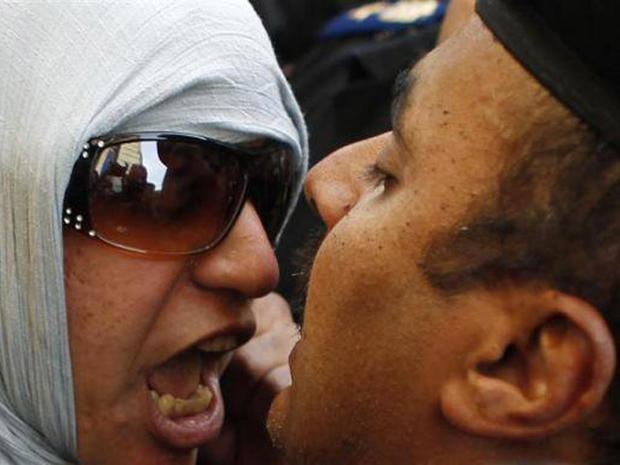
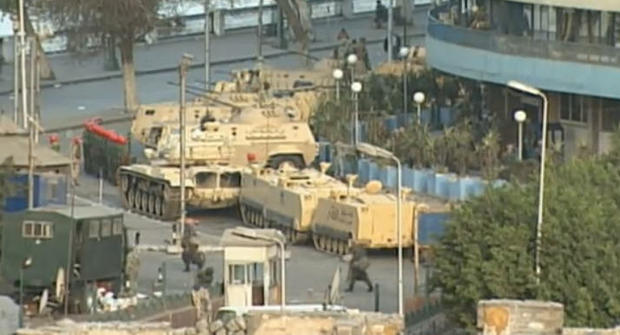
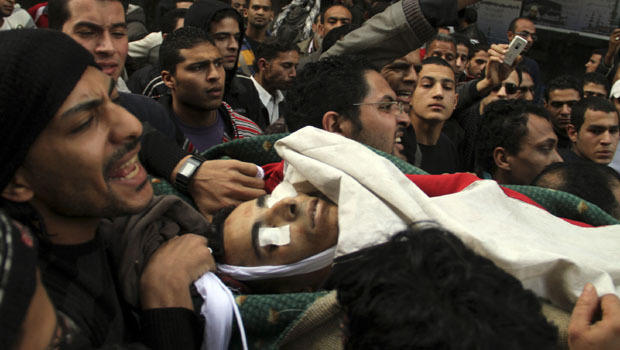
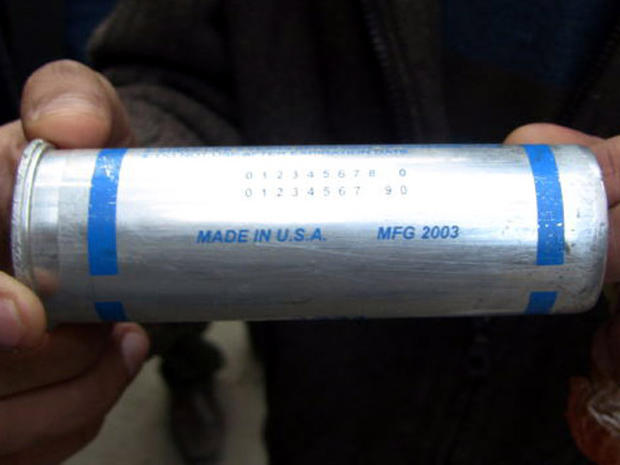

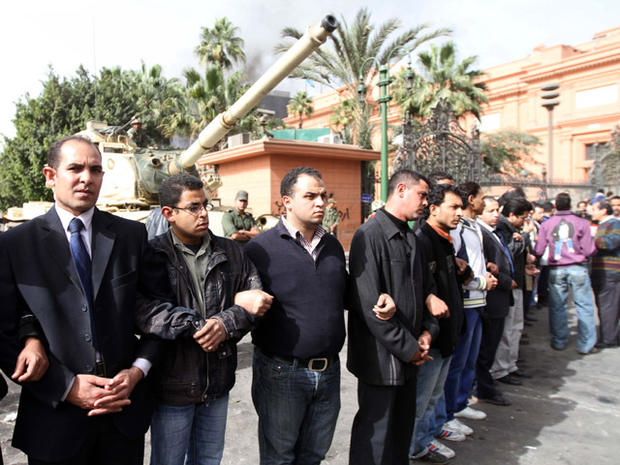
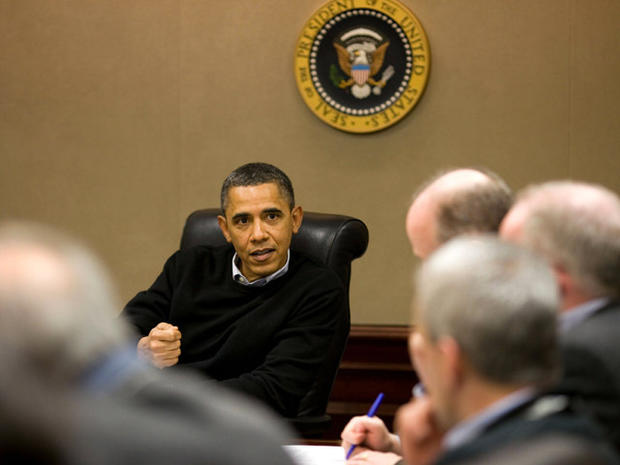
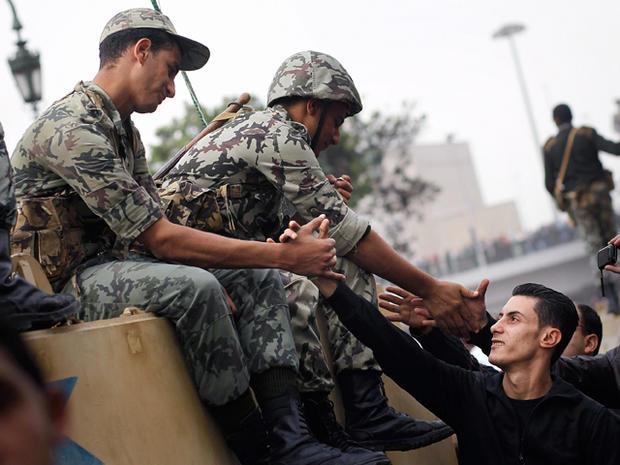
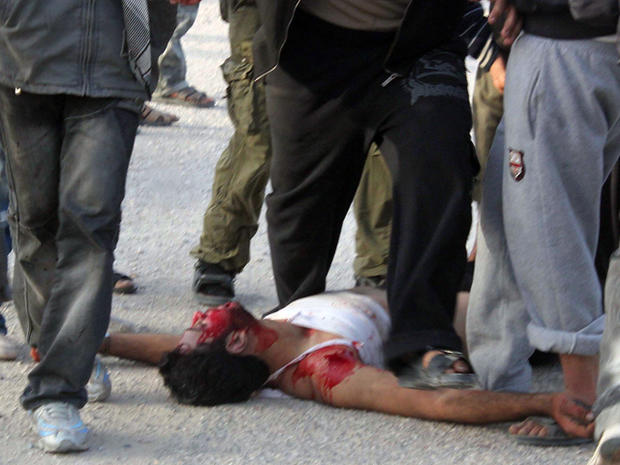
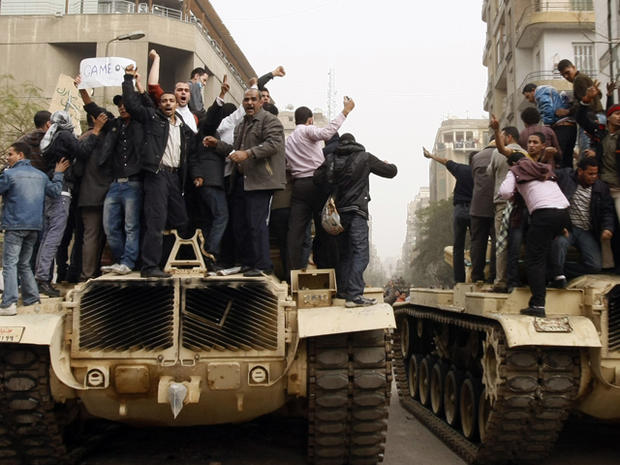
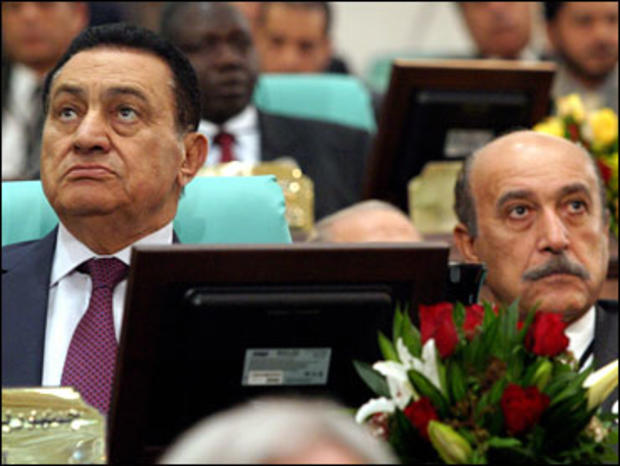
_660.jpg?v=55c0f85ebcd2b956528d9c6f5a7e8871#)